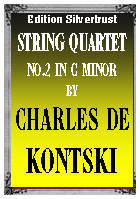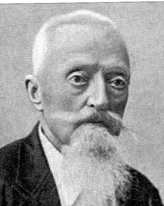Presents
Charles de Kontski
String Quartet No.2 in c minor-New Edition
Information about the Polish composer Charles de Kontski (born Karol Katski) is relatively scarce and much of the information which exists is often contradictory. He was born into a musical family in the Polish city of Krakow probably in 1815 although some sources say 1813. His father Grzegorz was a then prominent composer and pianist. Of his four sons, only two, Antoine (Antoni) a virtuoso pianist and Apolonaire (Apolonairy) a violinist whom Paganini considered to be of the first oreder, achieved a measure of international fame during their lifetimes. Something that Charles (Karol) and his brother Stanislaw did not. After the unsuccessful Polish uprising of 1831, all four brothers emigrated to Paris and took the surname de Kontski as their professional name. Although some sources list Karol as a virtuoso pianist, this was possibly because they confused him with his brother Antoni. He was, in fact like his brothers, sent to the General Music School in Warsaw. There he studied studied violin with Jozef Bielawski, concertmaster of the Warsaw National Performing Orchestra. Subsequent to his studies, he and his brother Antoni toured together giving violin and piano concerts in Lublin, Lvov, Vilnius, Moscow and St Petersburg where the Tsar, upon hearing them play, awarded them generous stipendiums. After emigrating to Paris, Karol earned his living by composing and teaching. Eventually, his works came to the attention not only of French audiences but also of the leading musicians in Paris, including Achille Gouffe, the famous principal bassist of the Paris Opera Orchestra. Gouffe took part in the premiere performance of de Konskiís String Quintet for 2 Violins, Viola, Cello and Bass. Kontski's violin playing was of a very high standard, which allowed him to obtain a position the most prestigious orchestra in Paris, the Opera Comique. He died in Paris in 1867 at the age of 52
The Quartet in c minor was dedicated to his friend and possibly his personal physician Dr Handvogel. It was completed immediately after his first string quartet in 1862. The opening movement, Allegro con brio, begins with a theme of yearning. Of note is the prominent role that the cello plays throughout the movement. The very romantic second movement, Andante con moto il sentimento, is a kind of Mendelssohnian song without words. Third comes a playful Scherzo sempre scherzando presented in canonic form. The Polish-tinged finale, Allegretto, begins like a rustic dance and is followed by several more lyrical episodes.
There are far and few Polish string quartets from the 19th century and this one, with its appealing melodies and excellent part-writing, is certainly a welcome addition to the repertoire.
Parts: $24.95
Parts & Score: $33.95

